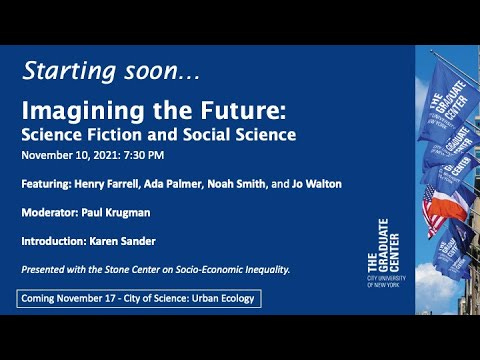First:
Chris Best & Hamish McKenzie: The Internet Needs Better Rules, Not Stricter Referees: ‘People are taking the wrong lessons from the Facebook Papers…. The key to a healthier platform is to flip the power dynamic: give the people themselves the power to choose what they pay attention to. Let the will of the people control their feeds, not the other way around. Instead of removing people’s agency by manipulating their attention in favor of the most profitable and provocative content, let them seek out what they really value. Other than in extreme cases involving violence or illicit activity, people should be allowed to decide for themselves who’s worth listening to, what’s trustworthy, and which direction is punching “down.” Beyond being undesirable, relying only on top-down moderation is ineffective: tech companies didn’t invent teen insecurity or tribal resentments, and they won’t fix those problems through censorship whack-a-mole. There is no world in which all vexing views can be banished. And if there were, none of us should want to live in it. There will be no perfect internet, but there can be a better one. A healthier internet requires overhauling incentives by putting people back in charge…
LINK:
One Video:
Henry Farrell & al.: Imagining the Future: Science Fiction and Social Science <https://www.youtube.com/watch?v=ilfcR-J85X8>
Very Briefly Noted:
George A. Akerlof (1970): “The Market for ‘Lemons’: Quality Uncertainty and the Market Mechanism”, Quarterly Journal of Economics, 84:3 (Aug), 488–500 <https://viterbi-web.usc.edu/~shaddin/cs590fa13/papers/AkerlofMarketforLemons.pdf>
Rose Wilder Lane: The Making of Herbert Hoover <https://archive.org/details/makingofherberth02lane/page/248/mode/2up?q=Chang>
James D. Muhly (1985): “Sources of Tin and the Beginnings of Bronze Metallurgy”, American Journal of Archaeology, 89:2 (Apr.), 275–291 <https://ancient-world-project.nes.lsa.umich.edu/tltc/wp-content/uploads/2016/05/METAL_METALLURGY_Muhly-1985-AJA_Sources-of-Tin-and-the-Beginning-of-the-Bronze-Age.pdf>
Herbert A. Simon (1991): “Organizations and Markets”, Journal of Economic Perspectives 5:2 (Spring), 25–44 <https://pubs.aeaweb.org/doi/pdfplus/10.1257/jep.5.2.25>
Cosma Shalizi: In Soviet Union, Optimization Problem Solves You: ‘Over 7800 words about optimal planning for a socialist economy and its intersection with computational complexity theory. This is about as relevant to the world around us as debating whether a devotee of the Olympian gods should approve of transgenic organisms. (Or: centaurs, yes or no?) Contains mathematical symbols (uglified and rendered slightly inexact by HTML) but no actual math, and uses Red Plenty mostly as a launching point for a tangent… <https://crookedtimber.org/2012/05/30/in-soviet-union-optimization-problem-solves-you/>
Sam Goldheart: 2021 MacBook Pro Teardown: A Glimpse at a Better Timeline <https://www.ifixit.com/News/54122/macbook-pro-2021-teardown>
Baratunde Thurston: Season 3 of How To Citizen Is Here!: ‘Also, Metatunde?…
Jamelle Boiue: ’Reminder that I have a movie podcast with [John Ganz] where we talk about the political and military thrillers of the 1990s. current episode is PATRIOT GAMES, next episode is CLEAR AND PRESENT DANGER, then after that is (probably) THE PACKAGE…
Paragraphs:
Timothy B. Lee: The 2000s Housing Bubble Was Greatly Exaggerated: ‘Housing prices are now above the supposedly unsustainable levels of 2006. And that’s after adjusting for inflation. And yet not very many people think we’re in the middle of a second housing bubble. Rather, most experts believe that today’s housing prices reflect “fundamental” factors. Interest rates are at all-time lows, giving homebuyers more spending power. And regulatory restrictions have created housing shortages in many metropolitan areas. But that leads to a question that at first glance might seem crazy: what if those same explanations largely explain the housing boom that peaked in 2006? What if the big problem in the early 2000s wasn’t an excess of houses but a shortage of them?… That’s the thesis of Shut Out, a 2019 book by Kevin Erdmann…. Erdmann argues that policymakers misdiagnosed the causes of the housing boom, and that led to catastrophic policy errors. In particular, because the Federal Reserve thought housing was overvalued in 2007, it didn’t cut rates fast enough in response to the housing crash…. If Erdmann and Schubert are right, we’re still living with the consequences of misdiagnosing the housing boom as a speculative bubble…
LINK: <https://fullstackeconomics.com/the-2000s-housing-bubble-was-greatly-exaggerated/>
Timothy Burke: Viewpoint Diversity (Not Again! Edition): ’Doesn’t matter how many times you think you’ve beaten the Terminator, it always comes back to life. Doesn’t matter how many times folks try, wearily, to challenge a very particular subset of self-validating public intellectuals with prestigious academic positions and secure access to major publications who continuously howl to the moon about how illiberal and narrow-minded academia or public culture has become, how silenced they have been. They’ll be back at it tomorrow with the same complaint, unaffected by any objections, challenges or conversations, announcing just how sagely heterodox they are. For folks in that little segment of the world, when you point out the actually narrow range of viewpoints they collectively hold to, they’ll typically respond that you’re wrong: some of them are Democrats and some of them are Republicans, as if that’s what “viewpoint diversity” means. I’m all for what I might mean by that phrase were I able to use it with any seriousness, given its capacious misuse by others. I once tried to put this as thinking of ideas, theories, methods, or frameworks within the academy in terms of “positive liberties”, e.g., that rather than saying “we should have free speech” as a negative liberty—that we do not suppress what a person already in the community might wish to say—we should say, “we’re trying to encourage the widest range of thinking and curiosity within the academy, we want to produce more variety and stimulate more idiosyncrasy, even just as conjectures, thought-experiments, explorations in curiosity.” That would be a good thing. That’s what “heterodoxy” could really mean…. If you’re really about heterodoxy, you’re about curiosity, about disagreeing with yourself, about uncertainty, about being provisional. You’re about seeking the best objections to your strongest arguments…. People who know it’s hard sometimes at least have the humility to not constantly beat their chests celebrating their own openness of mind and commitment to heterodoxy.
LINK:
Samuel Pepys: ’I home, and there to talk, with great pleasure all the evening, with my wife, who tells me that Deb. has been abroad today, and is come home and says she has got a place to go to, so as she will be gone tomorrow morning." This troubled me, and the truth is, I have a good mind to have the maidenhead of this girl, which I should not doubt to have…. But she will be gone and I not know whither. Before we went to bed my wife told me she would not have me to see Deb. or give her her wages, and so I did give my wife 10l. for her year and half a quarter’s wages, which she went into her chamber and paid her. And so to bed, and there, blessed be God! we did sleep well and with peace, which I had not done in now almost twenty nights together. Up, and had a mighty mind to have seen or given Deb. a little money, to which purpose I wrapt up 40s. in paper, thinking to have given her a little money, but my wife rose presently, and would not let me be out of her sight. My wife went down before me into the kitchen, and come up and told me that Deb. was in the kitchen, and therefore would have me go round the other way. Which she repeating and I vexed at it, answered her a little angrily, upon which she instantly flew out into a rage, calling me dog and rogue, and that I had a rotten heart; all which, knowing that I deserved it, I bore with. Word being brought presently up that Deb. was gone away by coach with her things, my wife was friends, and so all quiet, and I to the Office, with my heart sad, and find that I cannot forget the girl, and vexed I know not where to look for her. And more troubled to see how my wife is by this means likely for ever to have her hand over me, that I shall for ever be a slave to her. That is to say only in matters of pleasure, but in other things she will make her business to please me and to keep me right to her, which I will labour to be, for she deserves it of me, though it will be I fear a little time before I shall be able to wear Deb out of my mind. At the Office all the morning, and merry at noon, at dinner; and after dinner to the Office, where all the afternoon, doing much business, late. My mind being free of all troubles, I thank God, but only for my thoughts of this girl, which hang after her…
LINK:











I question that the "2000s Housing Bubble Was Greatly Exaggerated".
Yes, there were significant differences between regions. But one of those differences was that (as I recall from a study a few years back - no I don't have a cite) in some markets there appears to have been massive speculation. If memory serves, there were a handful of markets in which some significant percentage (maybe over 30%?) of mortgages were being written for houses that were not the owner's primary residence.
If you look at the Shiller graph from the article (https://lh3.googleusercontent.com/iS7uS8CpyUiqd_5I2CGHFIVDIK-tvGfsqTpxHqH5R91k_BC9nTvKnma1cidE1nqZ6bwpXum9crI-6i1lMf9EfglMYLtkrOm4KNCS6S55bAi4t7VpxBpWKNYPtF0hUVMzyNmJzdJl), you see that, in the beginning - from 1997 until 2002 or so - the housing market was just recovering to the level of the previous high. But after reaching that level, housing prices continued to rise and rise, to what were extraordinary levels, given the state of the housing market.
What else happened starting in the early 2000s? Those of us who were around will remember that there was a huge push to get into the housing market. There were articles, seminars, and entire television programs dedicated to getting rich by flipping houses. This period also saw the rise of unscrupulous mortgage brokers, particularly in low-income neighbourhoods, who would happily write loans that the buyers could never hope to pay off - unless they could sell off later at a higher price. While the previous owners of these properties were able to cash out at inflated sale prices.
Perhaps one could say that New York, San Francisco, and a handful of other booming regions were not in a bubble, but they are hardly the whole of the USA.